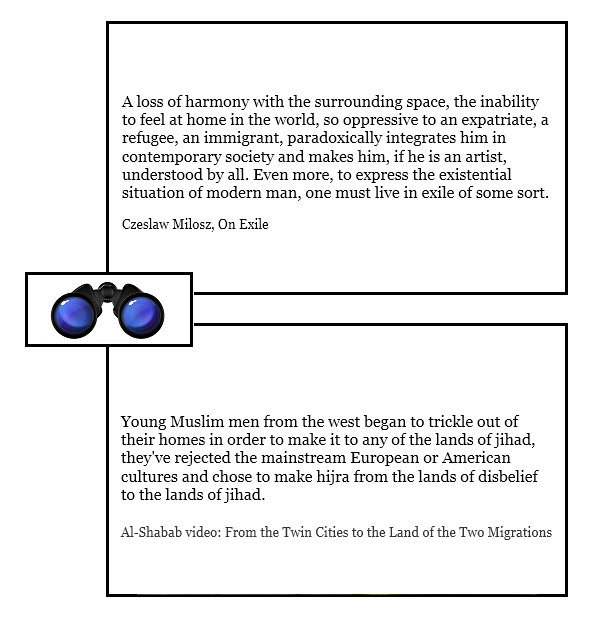On understanding Hijra
[ by Charles Cameron — the lure of exile, of hijra, in the context of western jihadists going abroad ]
.
Whereas the Prophet’s first visionary reception of the Quran dates to 609-610 CE, and the Prophet himself was born some 40 years earlier, the Islamic reckoning of time (AH, Anno Hegirae) begins with his hijra or migration from Mecca, his home, to Medina — an event of huge Islamic consequence, with echoes in our own times.
One of the questions I have been pondering recently has to do with those echoes. I have been asking myself how strong a part in the decisions of westerners to migrate to Syria and elsewhere to participate in jihad might be played by the concept of hijra — either in the minds of recruits, or in the rhetoric of recruiters.
When I came across the quote from Czeslaw Milosz (above, upper panel), I recognized that I had stumbled upon the expression of a secular equivalent of that yearning — and thus perhaps an opening into our own deeper understanding of hijra (lower panel) — a sacralization and hence an intensification of the same yearning.
**
It is therefore instructive to note conversely that Thomas Hegghammer, in his paper Should I Stay or Should I Go? Explaining Variation in Western Jihadists’ Choice between Domestic and Foreign Fighting, p 7, quotes Anwar al-Awlaki as advising a correspondent:
[Hearing] that you intend on making hijrah [emigration], I immediately wanted to contact you to tell you that my advice to you was to remainin your current position.
Here, strategic rationalism attempts to prevail over romantic yearning…
**
Sources:
Czeslaw Milosz, On Exile, quoted in Paris Review Al-Shabab video: The Path to Paradise: from the Twin Cities to the Land of the Two Migrations, at 08.23-08.36




August 16th, 2013 at 8:59 pm
Its the french foreign legion for fundamentalists.
It serves a useful function though, draining off the intellectually challenged, the sociopaths, the serial malcontents, (in this I view them as revolutionaries, shunned by there bourgeois neighbors) and sending them off to die far away from there host societies.
August 18th, 2013 at 5:21 pm
I just had a very helpful conversation with Mr Orange, who said:
The religious implications were what interested me, because I’m convinced that anything that supports the religious sanction for violence in a given person’s mind will have powerful “moral” impact.
.
Mr Orange’s comments strongly reinforce my point — particularly the comment that those who did not participate in the Hijra to Medina were and are considered hypocrites, interpreted as having analogous implications for the jihad today, and the emphasis on hijra in his reference to “a standard theme found in many jihadist publications”.
.
The better we understand the emotional force of these forms of symbolism, the clearer we’ll be in weighing our own options.